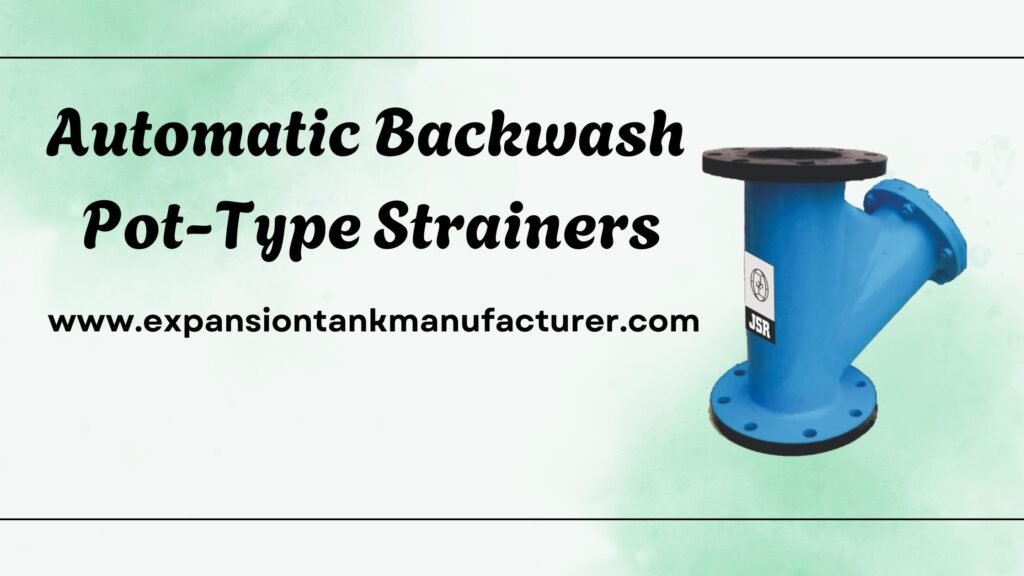The importance of maintaining system performance through efficient filtration in industries across India cannot be overstated. Whether in HVAC systems, water treatment plants, or industrial fluid processes, ensuring that fluid flow is unimpeded by contaminants is crucial for operational efficiency and equipment longevity. One of the key components to achieving this in industrial filtration systems is the Automatic Backwash Pot-Type Strainer Manufacturer in India.
In this blog, we will discuss the crucial role of automatic backwash pot-type strainers in maximizing system performance in India’s industries. We will also delve into why these strainers are gaining popularity among Indian manufacturers, especially in cities like Mumbai, Delhi, Bangalore, Chennai, and Hyderabad, where industrial growth is at its peak.
What is an Automatic Backwash Pot-Type Strainer?
An Automatic Backwash Pot-Type Strainer Supplier in India is one of the filters used to filter out particles and debris from liquids or gases passing through pipelines. It is different because it has an automatic backwashing mechanism. This automatically means that after the strainer has become clogged with contaminants, it automatically creates a self-cleaning mechanism to clear out debris without human intervention. This helps to maintain uninterrupted fluid flow and ensures minimal downtime, which is particularly beneficial in high-performance industrial systems.
The “pot” in the name refers to the shape of the strainer, which is often cylindrical and pot-like, providing a high volume for debris collection.
Why Are Automatic Backwash Pot-Type Strainers Crucial for System Performance in India?
The Indian industrial sector includes water treatment facilities, large HVAC systems within buildings, oil refineries, and chemical plants. In each industry, maintaining system processes with minimal system interruptions is paramount to ensuring maximum productivity and efficiency at minimal cost. This is the importance of the automatic backwash pot-type strainer.
Amongst these improvements made in strainers include:
1. Improved Efficiency and Reduced Downtime
The automatic backwash function means that these strainers can clean themselves without stopping the entire system for manual maintenance. In industries like chemical manufacturing in Hyderabad, where continuous flow is critical, this self-cleaning mechanism ensures the system remains operational with minimal interruptions, contributing to higher overall efficiency.
2. Reduced Maintenance Costs
As these strainers do not require much manual intervention for cleaning, they fundamentally lower maintenance time and labor costs. For the companies in Bangalore and Chennai looking to ensure that the production processes run without an iota of hitch, this automated feature benefits in terms of less physical cleaning by people for the strainers, thus lowering the operational cost.
3. Long-Term Durability and Reliability
Automatic backwash pot-type strainers are made to last, even under the most rigorous conditions. It is suited to the oil and gas industries of Mumbai because, once debris blocks systems, failures are catastrophic. Their durability allows them to be in service for years with less need for replacement or repair, an attractive feature to Indian industries that want solutions that can stand the test of time.
4. Prevention of System Failures
Strainers are essential to prevent damage by debris and contaminants to sensitive equipment, such as pumps, valves, and heat exchangers. The automatic backwashing process ensures strainers are always in good condition, averting costly repairs or system downtime. This has proven crucial in industries in Delhi and Noida, especially in the heavy demand for constant performance of the system. End.
5. Environmentally Friendly
Since the backwashing process is automatic, there is less reliance on water and chemicals for cleaning. This makes these strainers an environmentally friendly option for industries across India, such as those in green building and water treatment sectors in cities like Chennai and Bangalore, where environmental regulations are more stringent.
Key Benefits of Automatic Backwash Pot-Type Strainers in India’s Industries
1. Continuous Operation
For high-demand applications, like the HVAC system of a commercial building in Delhi, the fluid or air flow must remain constant for continued operation. With automatic backwash pot-type strainers in fluid systems, manufacturers will not need to shut down operations for cleaning and can keep the system running at maximum capacity all the time.
2. Easy Installation and Maintenance
Automatic backwash pot-type strainers are easy to install and require low maintenance. This makes it an ideal appliance for manufacturers based in regions like Hyderabad and Bangalore, where there is a cost incurred due to the loss generated during the downtime of installation and maintenance.
3. Cost-Effectiveness
These strainers significantly reduce the overall cost of maintenance by automating the cleaning process and reducing manual labor. For instance, water treatment plants in Mumbai can save time and money by opting for these advanced filtration systems that require little manual labor, thereby reducing the overall operational costs in the long term.
4. Flexibility and Customization
These strainers can be customized according to the type of fluid, flow rate, and the level of filtration required. Be it industrial pumps, water filtration systems, or chemical manufacturing, the flexibility to design the system to specific needs makes them ideal for industries across India, including Noida, Chennai, and Bangalore.
Applications of Automatic Backwash Pot-Type Strainers in India
- Water Treatment: Ensuring clean water for industrial and municipal use.
- HVAC Systems: Maintaining air and fluid quality in large commercial buildings in cities like Delhi and Chennai.
- Oil and Gas: Protecting high-value machinery in Mumbai and Kochi from debris.
- Chemical Manufacturing: Maintaining clean fluid systems in Bangalore and Hyderabad plants.
- Agricultural Irrigation: Protecting irrigation systems from blockages in rural and semi-urban areas of India.
Challenges in Implementing Automatic Backwash Pot-Type Strainers in India
Despite the above advantages, the widespread adoption of automatic backwash pot-type strainers in India has several challenges:
1. Initial Installation Cost
Automatic backwash pot-type strainers are expensive when compared to conventional filtration methods. However, it is usually offset by the savings over time in maintenance and efficiency.
2. Compatibility Issues
Some of the older systems may not be compatible with automatic backwash pot-type strainers and will require further modifications or replacement of existing equipment, which might temporarily disrupt operations.
3. Technical Expertise
Installation and calibration require skilled professionals, which is a challenge in some regions. However, as industries continue to modernize in cities like Bangalore and Chennai, the demand for trained professionals will grow.
Conclusion
Automatic backwash pot-type strainers are now changing the dynamics of filtration and fluid management by industries in India. They optimize system performance while minimizing downtime and costs associated with maintaining the system, making them very important in a wide range of applications such as water treatment, HVAC, oil and gas, and chemical manufacturing. Therefore, for manufacturers from key cities in India such as Delhi, Chennai, Bangalore, and Mumbai, adopting these strainers can efficiently improve efficiency and reduce costs to ensure long-term system reliability.
Investing in such advanced filtration technology, industries in India can be more efficient in their maintenance of high-performance systems and will not lag in a very competitive market.
FAQs
Q1: How does an automatic backwash pot-type strainer work?
A1: These strainers work by trapping debris in the filter. When the filter gets clogged, a backwash cycle is automatically triggered, cleaning the filter and restoring flow without manual intervention.
Q2: What industries benefit the most from these strainers in India?
A2: Industries like water treatment, HVAC systems, chemical manufacturing, and oil & gas in cities like Mumbai, Delhi, and Chennai benefit the most.
Q3: Can these strainers be used in all fluid systems?
A3: Yes, they are highly versatile and can be used in a wide range of fluid systems, including those dealing with water, oil, chemicals, and more.
Q4: Are there any environmental benefits to using these strainers?
A4: Yes, their self-cleaning mechanism reduces the need for excess water and chemicals during maintenance, making them an eco-friendly choice for industries.
Q5: How do I choose the right automatic backwash pot-type strainer for my system?
A5: The right strainer depends on your system’s flow rate, the type of fluid, and the level of filtration required. It’s recommended to consult an expert to determine the best option.



